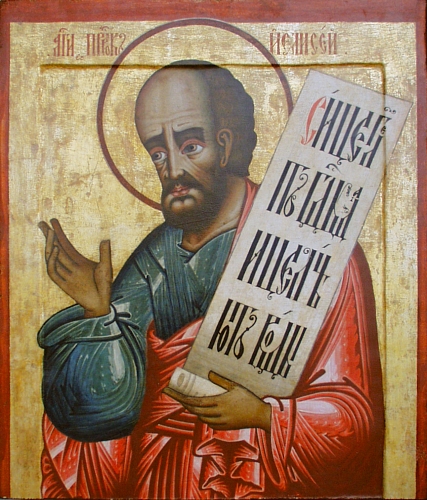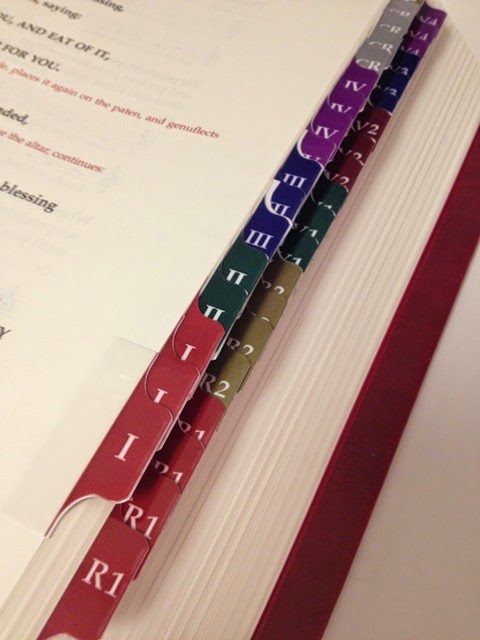THE FIRST COMMANDMENT: “I, the Lord, am your God, who brought you out of the land of Egypt, that place of slavery. You shall not have other gods besides me.”
- Have I performed my duties toward God reluctantly or grudgingly?
- Did I neglect my prayer life? Did I recite my usual prayers?
- Did I receive Holy Communion in a state of mortal sin or without the necessary preparation?
- Did I violate the one-hour Eucharistic fast?
- Did I fail to mention some grave sin in my previous confession?
- Did I seriously believe in something superstitious or engage in a superstitious practice such as palm reading or fortune-telling?
- Did I seriously doubt a matter of faith?
- Did I put my faith in danger - without a good reason – by reading a book, pamphlet, or magazine that contains material contrary to Catholic faith or morals?
- Did I endanger my faith by joining or attending meetings of organizations opposed to the Catholic faith such as non-Catholic services, Freemasonry, New Age cults or other religions? Did I take part in any of its activities?
- Have I committed the sin of sacrilege such as profanation of a sacred person, place or thing?
THE SECOND COMMANDMENT: “You shall not take the name of the Lord, your God, in vain.”
- Did I fail to try my best to fulfill the promises and resolutions that I made to God?
- Did I take the name of God in vain? Did I make use of God’s name mockingly, jokingly, angrily, or in any other irreverent manner?
- Did I Make use of the Blessed Virgin Mary’s name or another saint’s name mockingly, jokingly, angrily or in any other irreverent manner?
- Have I been a sponsor in baptism or participated actively in other ceremonies outside the Catholic Church?
- Did I tell a lie under oath?
- Did I break public or private vows?
THE THIRD COMMANDMENT: “Remember to keep holy the Sabbath day.”
- Did I miss Mass on a Sunday or a holy day of obligation?
- Did I fail to dress appropriately for Mass?
- Have I, without sufficient reason, arrived at Mass so late that I failed to fulfill the Sunday or holy day of obligation?
- Did I allow myself to be distracted during Mass, by not paying attention, by looking around out of curiosity, etc?
- Did I cause another to be distracted at Mass?
- Have I performed any work or business activity that would inhibit the worship due to God, the joy proper to the Lord’s Day, or the appropriate relaxation of mind and the body, on a Sunday or a holy day of obligation?
- Did I fail to generously help the church in her necessities to the extent that I am able?
- Did I fail to fast or abstain on a day prescribed by the Church?
THE FOURTH COMMANDMENT: “Honor your father and your mother.”
For parents:
- Have I neglected to teach my children their prayers, send then to church or give them a Christian education?
- Have I given them a bad example?
- Have I neglected to watch over my children, to monitor their companions, the books they read, the movies and TV shows they watch?
- Have I failed to see to it that my child made his first confession and first communion?
- Have I failed to see to it that my children have received the sacrament of confirmation?
- Was I disobedient toward my parents?
- Did I neglect to help my parents when my help was needed?
- Did I treat my parents with little affection or respect?
- Did I react proudly when I was corrected by my parents?
- Did I have a disordered desire for independence?
- Did I do my chores?
- Have I supported my parents in times of need to the extent that I am able?
- Have I ensured that my parents are adequately cared for in terms of food, clothing and shelter?
- Have I spoken to my parents respectfully and been tolerant of their shortcomings?
- Have I listened to their advice patiently and humbly, with an eye toward learning from their experience?
- Have I made an effort to visit my parents and to allow them time to visit with grandchildren?
THE FIFTH COMMANDMENT: “You shall not kill.”
- Did I easily get angry or lose my temper?
- Was I envious or jealous of others?
- Did I injure or take the life of anyone?
- Was I reckless in driving?
- Was I reckless in the operation of mechanical equipment, chemicals or other potentially dangerous items?
- Was I reckless in the use of firearms? Did I fail to keep firearms secured so that others, including children, could not access them?
- Was I an occasion of sin for others by way of conversation; the telling of jokes which are religiously, racially or sexually offensive; dressing; inviting somebody to attend certain shows; lending of harmful books or magazines; helping someone to steal, etc? Did I try to repair the scandal done?
- How many persons did I lead to sin? What sins were involved?
- Did I neglect my health?
- Did I attempt to take my life?
- Did I get drunk or use prohibited drugs?
- Did I get carried away with gluttony? Did I eat or drink more than a sufficient amount? Did I eat at the wrong times? Did I eat to make myself feel better? Did I demand overly prepared or fancy food instead of being satisfied with simple and plain food? Did I fail to eat with a sense of reverence and thanksgiving, knowing that each earthly meal points to the Heavenly meal of the Eucharist?
- Did I participate in any form of physical violence?
- Did I consent to or actively take part in direct sterilization such as tubal ligation, vasectomy, etc? Do I realize that this will have a permanent effect on my married life and that I will have to answer to God for its consequences?
- Did I consent to, advise someone about, or actively take part in an aboration? Was I aware that the Church punishes with automatic excommunication those who procure and achieve abortion? Do I realize that this is a very grave crime?
- Did I cause harm to anyone with my words or actions?
- Did I desire revenge or harbor enmity, hatred, or ill feelings when someone offended me?
- Did I ask pardon whenever I offended anyone?
- Did I insult of offensively tease others?
- Did I quarrel with one of my brothers or sisters?
THE SIXTH AND NINTH COMMANDMENTS: “You shall not commit adultery” and “You shall not covet your neighbor’s wife.”
- Did I willfully entertain impure thoughts?
- Did I consent to evil desires against the virtue of purity, even though I may not have carried them out? Were there any circumstances that aggravated the sin: affinity (relationship by marriage), consanguinity (blood relationship), either the married state or the consecration to God of a person involved?
- Did I engage in impure conversations? Did I start them?
- Did I look for fun in forms of entertainment that placed me in proximate occasion of sin, such as certain dances, movies, shows, or books with immoral content? Did I frequent houses of ill repute or keep bad company?
- Did I realize that I might already have been committing a sin by placing myself in a proximate occasion of sin, such as sharing a room with a person I find sexually attractive, or being alone with such a person in circumstances that could lead to sin?
- Did I fail to take care of those details of modesty and decency that are the safeguards of purity?
- Did I fail, before going to a show or reading a book, to find out its moral implications, so as not to put myself in immediate danger of sinning in order to avoid distorting my conscience?
- Did I willfully look at an indecent picture or can an immodest look upon myself or another? Did I willfully desire to commit such a sin?
- Did I lead others to sins of impurity or immodesty? What sin?
- Did I commit an impure act? By myself, through masturbation (which is objectively a mortal sin)? With someone else? How many times? With someone of the same or opposite sex? Were there any circumstances of relationship (such as affinity) that could have given the sin special gravity? Did this illicit relationship result in pregnancy? Did I do anything to prevent or end that pregnancy?
- Do I have friendships that are habitual occasions of sexual sin? Am I prepared to end them?
- In courtship, is true love my fundamental reason for wanting to be with the other person? Do I live the constant and cheerful sacrifice of not putting the person I love in danger of sinning? Do I degrade human love by confusing it with selfishness or mere pleasure?
- Did I engage in acts such as “petting”, “necking”, passionate kisses or prolonged embraces?
- Did I, without serous reason, deprive my spouse of the marital right? Did I claim my own rights in a way that showed no concern for my spouse’s state of mind or health? Did I betray conjugal fidelity in desire or in deed?
- Did I take “the pill” or use any other artificial birth-control device before or after new life had already been conceived?
- Did I, without grave reason, with the intention of avoiding conception, make use of marriage on only those days when offspring would not likely be engendered?
- Did I suggest to another person the use of birth-control pills or another artificial method of preventing pregnancy (like condoms)?
- Did I have a hand in contributing to the contraceptive mentality by my advice, jokes, or attitudes?
THE SEVENTH AND TENTH COMMANDMENTS: “You shall not steal” and “You shall not covet your neighbor’s goods.”
- Did I steal? How much money or how much was the object worth? Did I give it back or at least have the intention of doing so?
- Have I done or caused damage to another person’s property? To what extent?
- Did I harm anyone by deception, fraud, or coercion in business contracts or transactions?
- Did I unnecessarily spend beyond my means? Do I spend too much money because of vanity or caprice?
- Do I give alms according to my capacity?
- Was I envious of my neighbor’s goods?
- Did I neglect to pay my debts?
- Did I knowingly accept stolen goods?
- Did I desire to steal?
- Did I give in to laziness or love of comfort rather than diligent work or study?
- Was I greedy? Do I have an excessively materialistic view of life?
THE EIGHTH COMMANDMENT: “You shall not bear false witness against your neighbor.”
- Did I tell lies? Did I repair any damage that may have resulted as a consequence of this?
- Did I unjustly or rashly accuse others?
- Did I sin by detraction, that is, by telling the faults of another person without necessity?
- Did I sin by calumny, that is, by telling derogatory lies about another person?
- Did I engage in gossip, backbiting, or tale-telling?
- Did I reveal a secret without due cause?
If you remember other serous sins besides those indicated here, include them also in your confession.
-Tim-





















